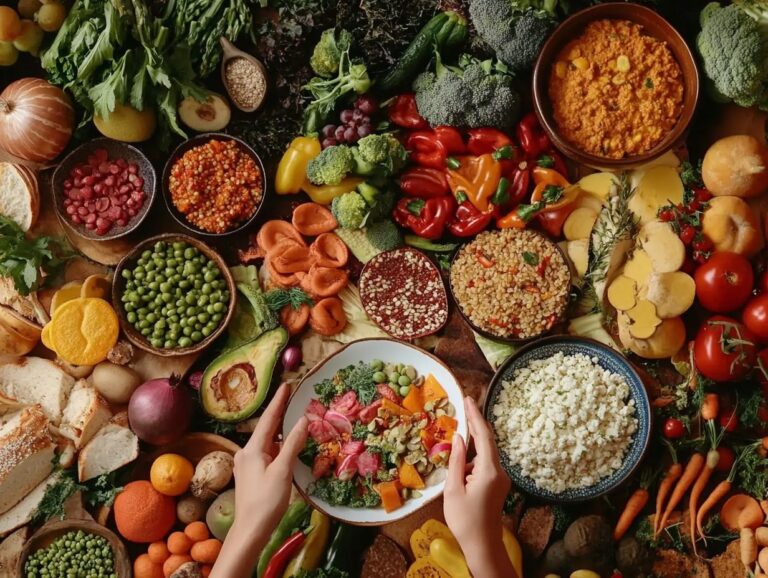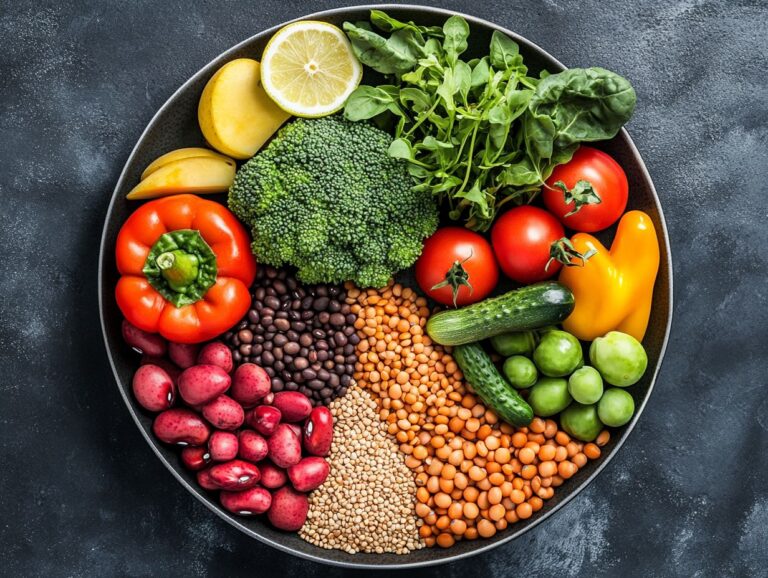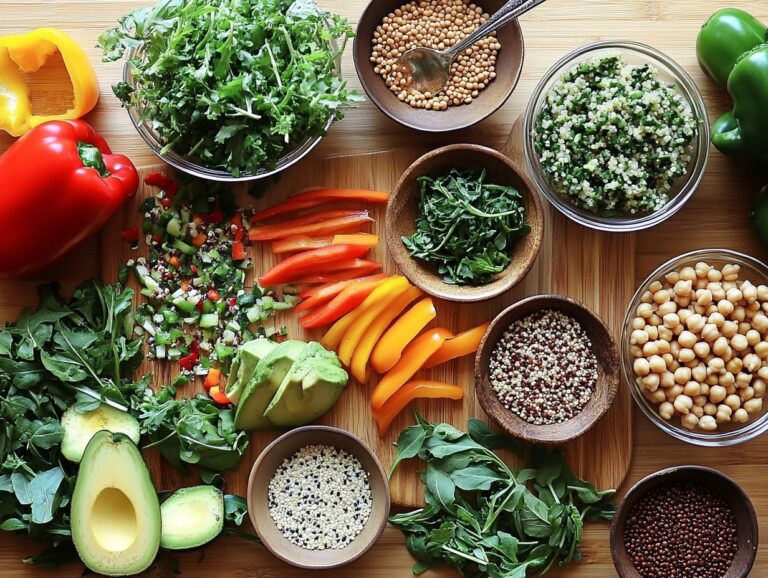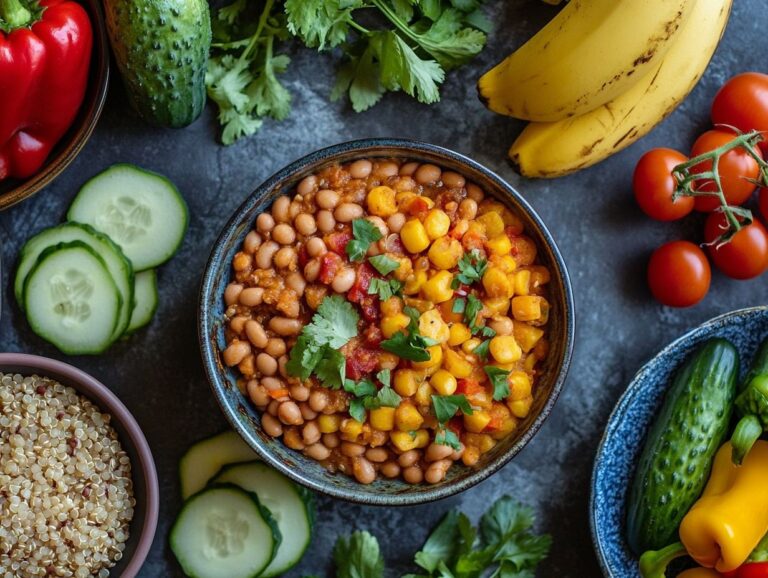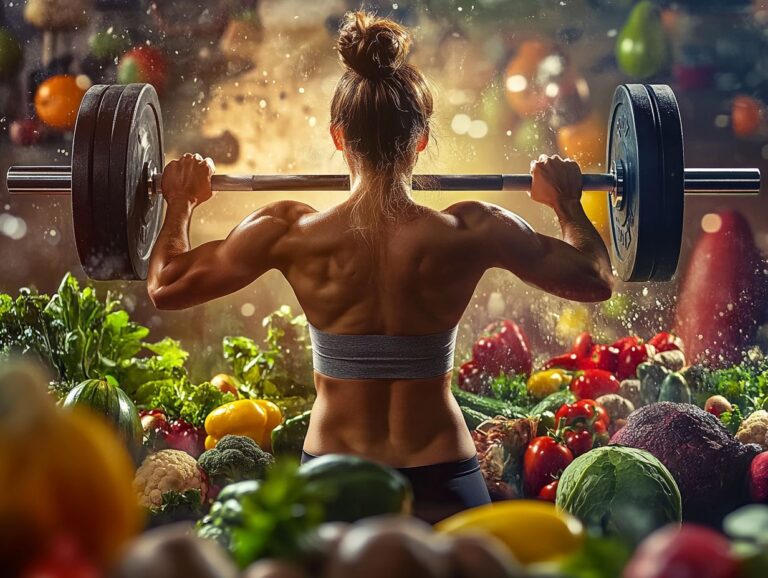As the popularity of plant-based diets continues to soar, many fitness enthusiasts are exploring the potential of a vegan diet for muscle gain and muscle building.
This article uncovers what a vegan diet entails, discusses its health benefits and challenges for building muscle, and highlights the best plant-based foods to support fitness goals and protein intake.
Whether you’re a seasoned athlete or just starting your fitness journey, discover practical meal plans, essential supplements, and tips for incorporating vegan protein sources and resistance training to maximize strength training results and muscle recovery.
Key Takeaways:
- A vegan diet can provide sufficient protein for building muscle, as long as it is well-planned and balanced.
- Plant-based foods such as legumes, nuts and seeds, tofu, and quinoa are great options for muscle gain on a vegan diet.
- Planning meals ahead, experimenting with recipes, and prioritizing micronutrient intake can help incorporate vegan protein sources into a muscle-building diet.
What is a Vegan Diet?
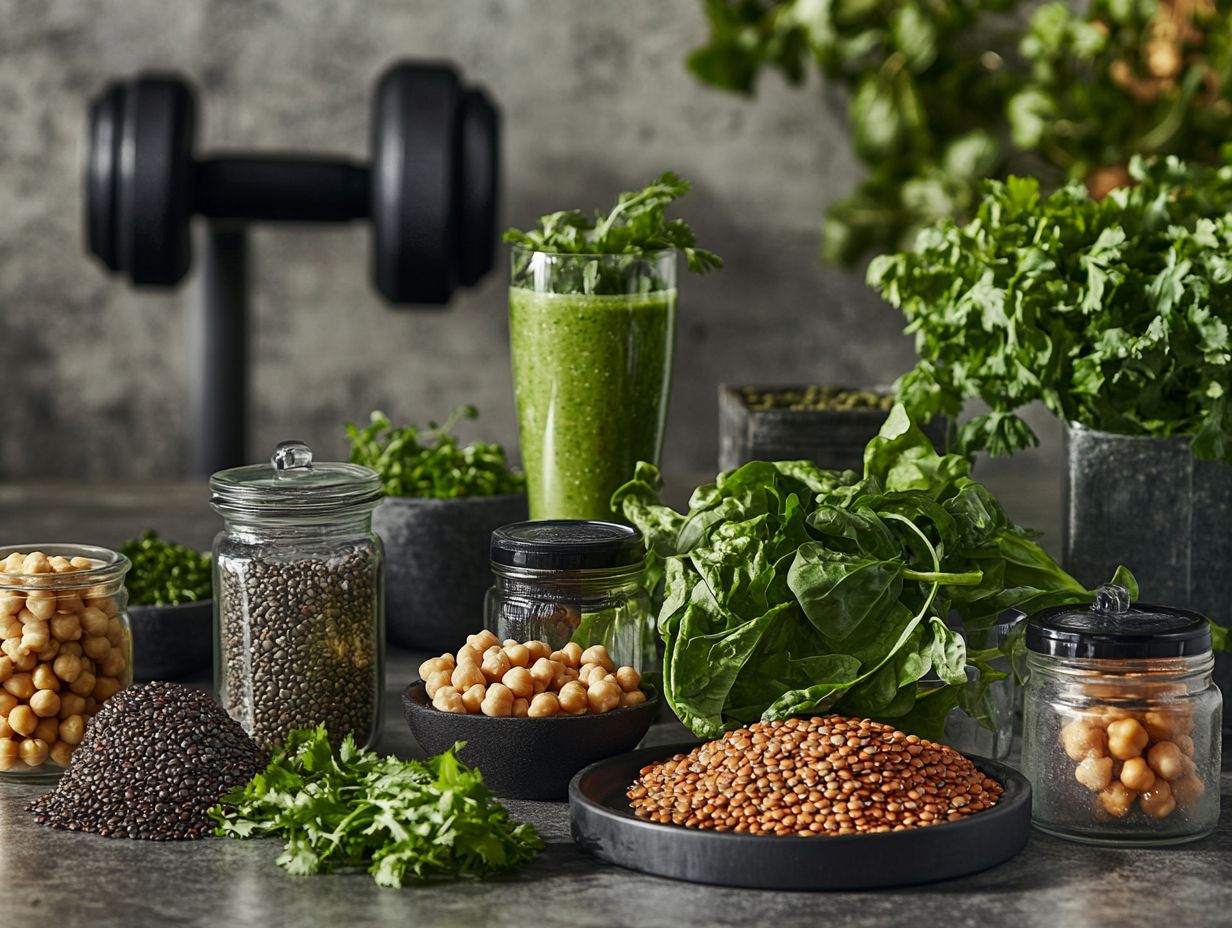
A vegan diet is a plant-based diet that excludes all animal products, including meat, dairy, and eggs, while focusing on whole foods and nutrient density. This diet emphasizes fruits, vegetables, legumes, nuts, and seeds, all of which offer significant health benefits such as reducing the risk of heart disease.
By avoiding processed foods, individuals not only support their fitness goals but also contribute to sustainable living practices. Embracing veganism involves a comprehension of calories, protein intake, and other essential nutrients necessary for optimal health.
Can You Build Muscle on a Vegan Diet?
Building muscle on a vegan diet is possible by emphasizing adequate protein intake, nutrient density, and effective resistance training. Many athletes, including Robert Cheeke and Matt Frazier, authors of The Plant-Based Athlete and Vegan Bodybuilding & Fitness, have successfully achieved impressive fitness goals while following a plant-based diet.
Their success is rooted in a thorough understanding of various plant protein sources that are rich in essential amino acids, which are crucial for muscle recovery and growth. By developing appropriate exercise programs and meal plans, vegans can effectively build muscle mass.
What are the Benefits of a Vegan Diet for Muscle Gain?
A vegan diet offers several advantages for muscle gain, including improved nutrient density, enhanced recovery, and a reduced risk of chronic diseases such as heart disease.
Plant-based foods are rich in antioxidants and phytochemicals that support overall health and recovery after resistance training. By focusing on whole foods such as legumes, nuts, and leafy greens, individuals can ensure they meet their amino acid needs, which are essential for muscle growth.
Plus these primary benefits, a vegan diet promotes better hydration and circulation, both of which are crucial for optimal muscle performance and recovery. The high Andi score of many plant-based foods ensures they are nutrient-dense, supporting both short-term and long-term health.
Fruits and vegetables are high in water and electrolytes, helping to sustain energy during workouts and reduce recovery times by flushing out metabolic waste. Furthermore, the high fiber content in a plant-based diet contributes to a more diverse gut microbiome, which is increasingly recognized for its role in nutrient absorption and overall health.
Thus, adopting a vegan lifestyle can be beneficial for athletes on their muscle gain journey while also promoting overall well-being.
What are the Challenges of Building Muscle on a Vegan Diet?
Building muscle on a vegan diet is possible, but it does present certain challenges, such as ensuring adequate protein intake and effectively managing energy expenditure. Many individuals may struggle with food choices and may rely on processed foods that can impede muscle growth.
To overcome these obstacles, it is important to focus on calorie-dense whole foods that provide the essential nutrients needed for muscle growth and recovery. Understanding one’s basal metabolic rate and structuring meal plans can help address these challenges.
It is crucial to include a variety of plant-based protein sources, such as:
- Legumes
- Nuts
- Seeds
- Whole grains
to ensure the intake of all essential amino acids. Tracking macronutrient intake can benefit some individuals, allowing for adjustments to meet their specific energy needs. Additionally, protein powders made from peas or brown rice can be incorporated to reach protein goals without excessive caloric intake.
Ensuring adequate hydration and considering the timing of nutrient consumption around workouts can further enhance muscle building on a vegan diet.
What are the Best Plant-Based Foods for Muscle Gain?
The best plant-based foods for muscle gain include legumes, nuts, seeds, tofu, quinoa, and leafy greens. These nutrient-dense foods provide essential amino acids that are crucial for muscle repair and growth.
Incorporating these whole foods into a well-balanced meal plan can help individuals meet their daily protein intake requirements while supporting overall fitness goals. Plus being high in protein, these foods also contain other important nutrients that promote muscle recovery and enhance performance during resistance training.
1. Legumes
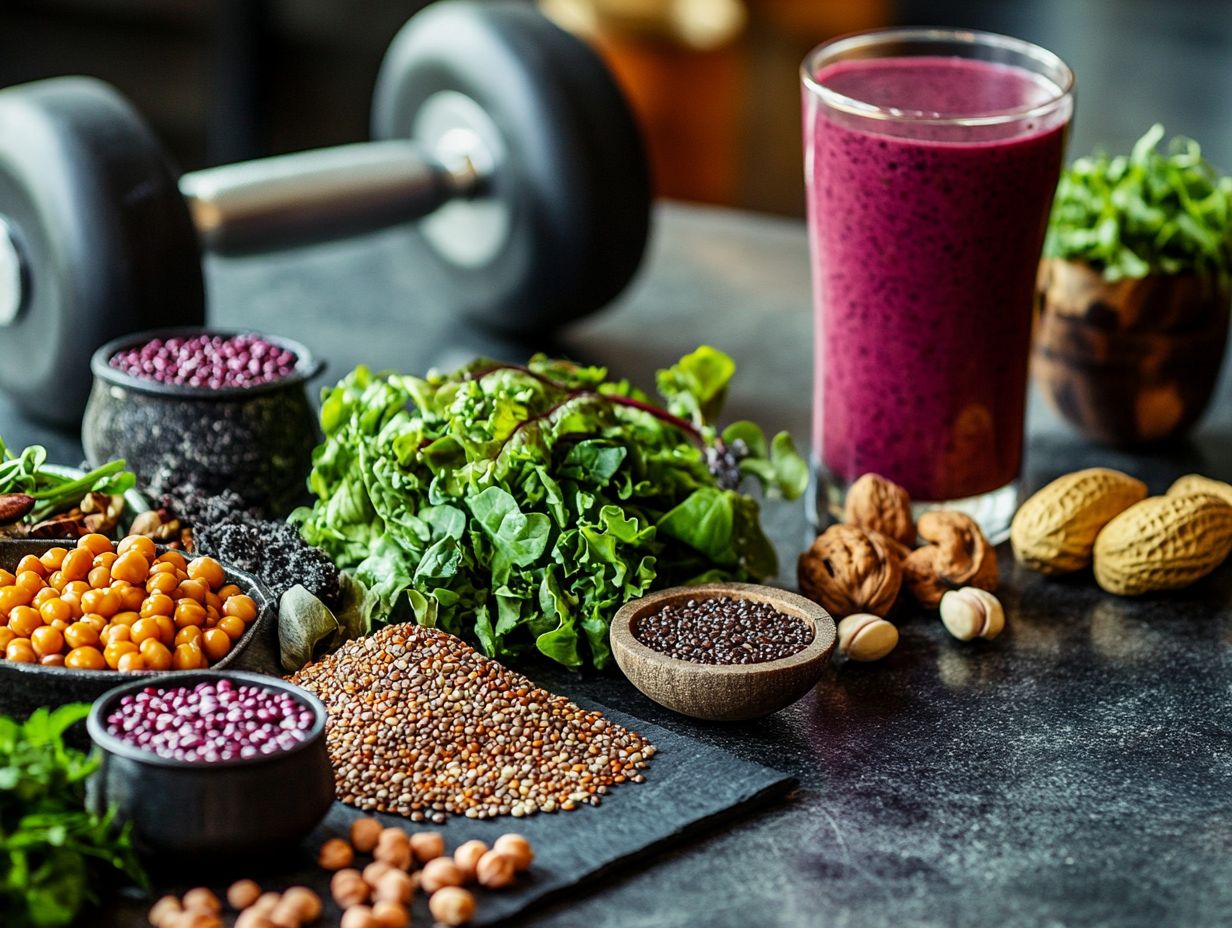
Legumes, including black beans, lentils, and chickpeas, are excellent sources of plant protein, boasting high nutrient density and fiber content that supports digestion. They play a crucial role in a vegan diet for muscle gain by providing the essential amino acids necessary for muscle recovery and growth.
Rich in complex carbohydrates, legumes also contain a variety of vitamins and minerals, making them an ideal protein source for individuals looking to incorporate muscle-building foods into their meal plans. Their high fiber content contributes to a healthy digestive system and helps maintain steady energy levels during workouts, both of which are vital for optimal performance.
By consuming a variety of legumes daily—whether in hearty salads or blended into nutritious smoothies—individuals can maximize the benefits of legumes while meeting their dietary needs for effective muscle growth.
2. Nuts and Seeds
Nuts and seeds are rich in healthy fats, protein, and omega-3 fatty acids, making them essential for muscle gain on a vegan diet. Consuming a variety of nuts, such as almonds and walnuts, along with seeds like chia and flaxseed, can enhance overall calorie intake while increasing nutrient density.
These nutrient-dense foods support muscle repair and growth, providing a valuable source of vitamins and minerals essential for overall health. For instance, almonds are an excellent source of vitamin E, which possesses antioxidant properties, while walnuts provide alpha-linolenic acid, a type of omega-3 fatty acid known for its cardioprotective effects.
Additionally, hemp seeds are notable for being a complete protein, containing all nine essential amino acids, making them an excellent choice for any vegan diet. Regularly incorporating these foods can enhance satiety and boost energy levels throughout the day.
3. Tofu and Tempeh
Tofu and tempeh are well-known sources of plant protein that contain essential amino acids necessary for muscle building in a vegan diet. These soy-based foods are versatile and can be incorporated into a variety of dishes, making them an excellent choice for meeting protein intake goals.
Not only are tofu and tempeh protein-dense, but they are also rich in essential nutrients, including calcium and magnesium, which are important for bone health.
Tofu can be found in silken or firm varieties, making it an adaptable ingredient that can be blended into smoothies, stir-fried with vegetables, or grilled. Tempeh, with its nutty flavor, serves as a great meat alternative in tacos, salads, and soups.
Incorporating these nutritious options into meal plans allows individuals to diversify their diets while satisfying their protein needs, making every meal both enjoyable and healthy.
4. Quinoa
Quinoa is a unique grain that provides complete protein, meaning it contains all nine essential amino acids necessary for muscle growth and recovery. As a gluten-free carbohydrate source, quinoa is nutrient-dense and serves as an excellent base for a variety of muscle-building dishes.
The Pros: Quinoa is easy to prepare and versatile, complementing many flavors in dishes such as salads, bowls, and sides.
The Cons: On its own, quinoa has a limited flavor and must be paired with other healthy ingredients to enhance its taste.
Athletes and individuals aiming to build muscle can incorporate quinoa into healthy vegetable stir-fries or savory breakfast porridge. Its high protein content supports muscle gain, providing the body with the energy needed for high-intensity workouts.
Additionally, quinoa is rich in several vitamins and minerals that contribute to overall well-being, helping to keep one feeling full and energized throughout the day.
5. Soy Milk
Soy milk is a widely available dairy substitute that is rich in protein, calcium, and other essential nutrients, making it an excellent addition to a vegan diet. Drinking fortified soy milk can help individuals meet their daily protein requirements and support healthy muscle gain.
Additionally, soy milk is abundant in isoflavones, which are believed to have various health benefits, including promoting heart health and maintaining bone density. Those following a well-balanced vegan diet can easily incorporate soy milk into their daily routines through smoothies, baking, or by serving it with cereals.
Its creamy texture and mild flavor make soy milk a versatile ingredient that enhances the taste of both sweet and savory dishes. Many brands of soy milk are available on the market, often fortified with additional nutrients. Fortified soy milk containing vitamin B12 and vitamin D is readily accessible and can be especially important for individuals who do not consume animal products, particularly to support their vegan diet and ensure they receive essential nutrients.
What are Some Sample Vegan Meal Plans for Muscle Gain?
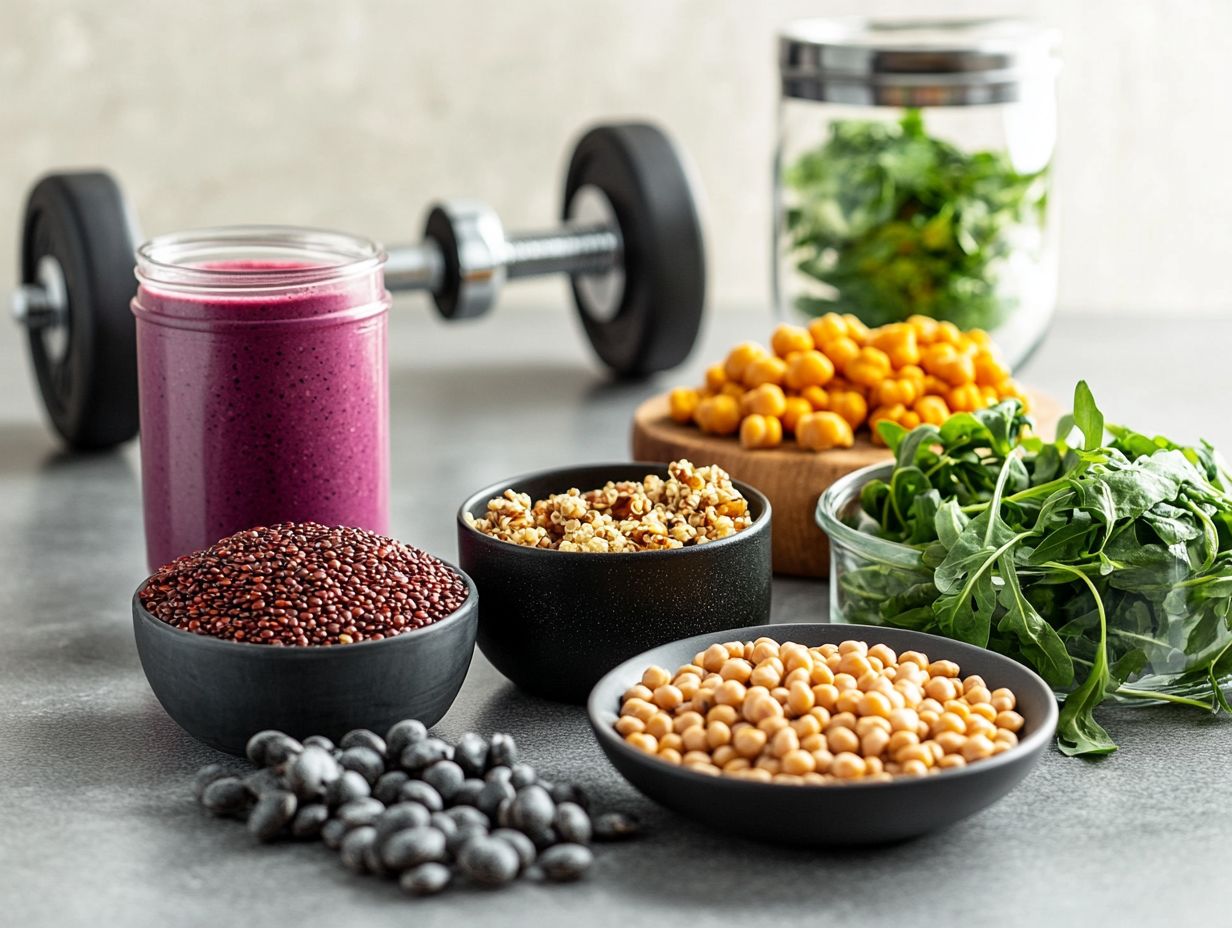
Sample vegan meal plans for muscle gain should consist of a variety of nutrient-dense options aimed at maximizing protein intake throughout the day. These meal plans focus on whole foods to increase nutrient density and provide health benefits.
A well-structured meal plan might include a high-protein breakfast, a protein-rich lunch, and a nutrient-dense dinner, all of which work together to support fitness goals, enhance muscle building, and facilitate muscle recovery from resistance training.
1. High-Protein Breakfast
You can start your day with a high-protein breakfast, such as a tofu scramble or a protein-rich smoothie that includes plant-based ingredients like spinach, bananas, and nut butter. These meals not only provide a satisfying breakfast but also help you meet your protein requirements.
Incorporating ingredients like chia seeds or hemp hearts can further enhance the protein content, supplying essential amino acids necessary for muscle repair and growth. For instance, a chia pudding topped with berries makes a delicious and nutritious alternative.
Another excellent option is preparing a quinoa bowl with black beans, diced avocado, and a sprinkle of nutritional yeast. Nutritional yeast not only boosts the protein profile but also adds a cheesy flavor without any dairy.
These plant-based breakfasts provide essential fuel for your body and support overall health by ensuring you receive the nutrients needed to maintain a healthy lifestyle.
2. Protein-Packed Lunch
A protein-packed lunch can feature a delicious and energy-dense quinoa salad with legumes such as chickpeas or black beans, which helps maintain performance throughout the day. This aligns with Robert Cheeke’s approach to Vegan Bodybuilding & Fitness by integrating plant protein sources.
This meal ensures both adequate protein intake and nutrient density. To enhance the vitamin and mineral content, various colorful vegetables like leafy greens, spinach, bell peppers, and tomatoes can be added.
An olive oil and lemon dressing not only improves the taste but also provides healthy fats that contribute to overall energy. Additionally, grilled chicken or tofu can be included, as both are excellent sources of lean protein beneficial for muscle recovery and growth.
This well-balanced meal is perfect for anyone looking to boost their energy levels and support muscle gain.
3. Nutrient-Dense Dinner
A nutrient-dense dinner can consist of a stir-fry featuring tofu, a variety of vegetables, and a side of brown rice or quinoa. This meal is well-balanced, providing a source of plant-based protein and healthy fats that aid in recovery and muscle gain after a day of resistance training.
Adding vegetables such as bell peppers, broccoli, and snap peas not only enhances the flavor of the dish but also boosts its vitamin and fiber content. Incorporating chickpeas or black beans further increases the protein content, creating a well-rounded plate.
To elevate the taste and add healthy fats, a tangy tahini or sesame dressing can be drizzled over the stir-fry. Fresh herbs like cilantro or basil can be added as a garnish.
By combining these elements, you can create a nutritious and delicious dinner option.
What Supplements Can Help with Muscle Gain on a Vegan Diet?
Supplements can support muscle gain on a vegan diet, particularly plant-based protein powders, branched-chain amino acids (BCAAs), and creatine. These are frequently recommended by experts like Matt Frazier, author of The Plant-Based Athlete, for effective muscle building.
These supplements help ensure adequate protein intake and facilitate muscle recovery after exercise, thus helping individuals achieve their fitness goals and improve their exercise program outcomes.
1. Plant-Based Protein Powders
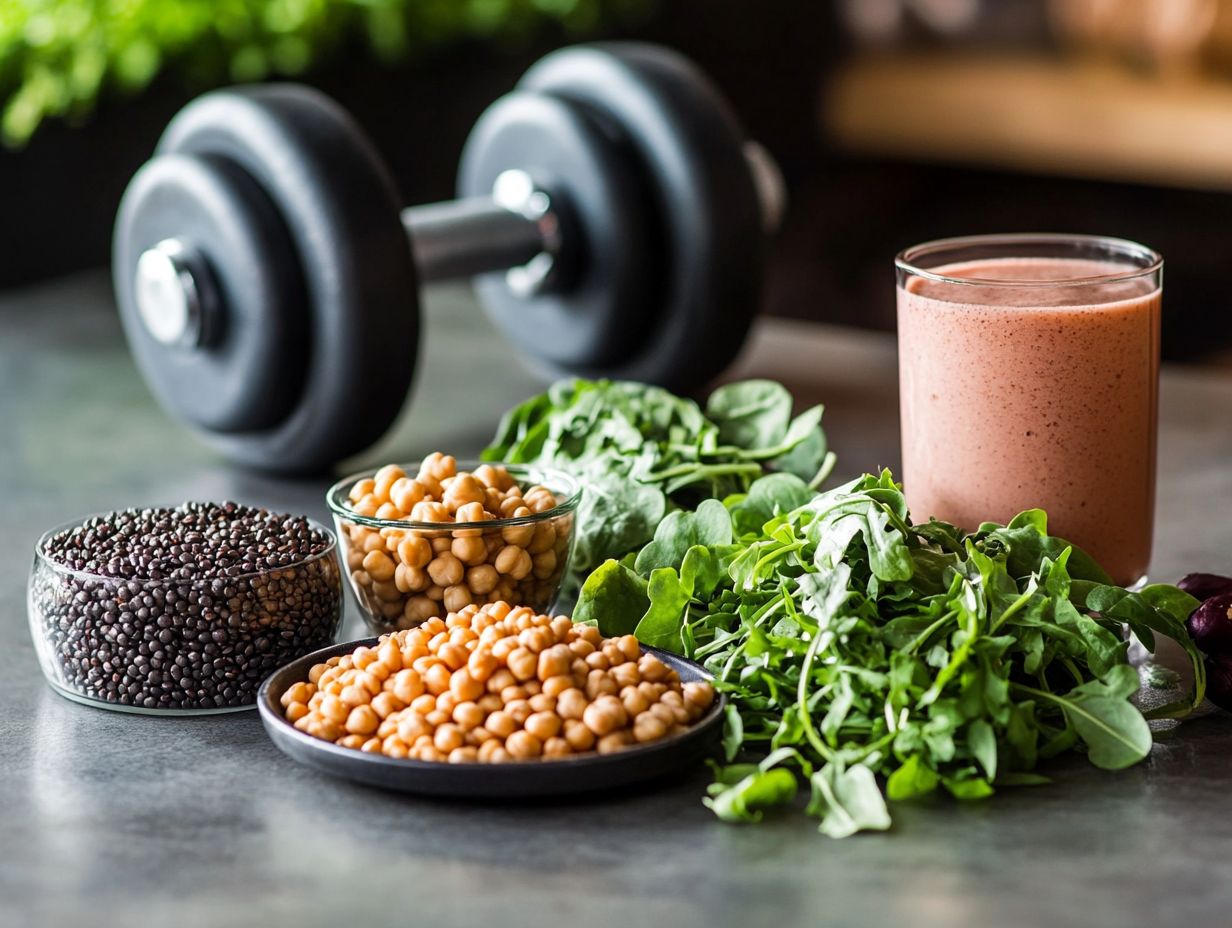
Plant-based protein powders, derived from sources such as peas, brown rice, and hemp, are excellent for supplementing daily protein intake and aiding muscle recovery. These powders provide essential amino acids that support muscle growth and can be easily added to shakes or meals.
They are particularly beneficial for individuals following vegetarian or vegan lifestyles, but they also offer a healthy option for anyone across various dietary preferences. Additionally, plant-based protein options are often easier to digest than some animal-based proteins, which can cause bloating or discomfort.
The inclusion of fiber and other nutrients in plant protein powders contributes to overall health while also facilitating muscle repair. By thoughtfully incorporating a variety of plant protein sources into their diets, individuals can adopt a diverse approach to fitness and health that promotes muscle growth and recovery.
2. Creatine
Creatine is a well-researched supplement that can boost muscle gain and enhance performance during high-intensity exercise, making it particularly beneficial for those following a vegan diet.
Since creatine is primarily found in animal products, supplementation allows vegans to achieve higher creatine levels for optimal results. Research has shown that individuals who incorporate creatine into their regimen experience significant increases in strength and muscle mass. This is especially advantageous for vegans and vegetarians, who often have lower levels of muscle mass.
For those with a low baseline of muscle creatine, as is common among vegans, supplementation may improve recovery and endurance. Vegans who respond positively to creatine supplementation have been demonstrated to benefit from increased muscle energy levels, potentially leading to enhanced performance and improved exercise outcomes.
Furthermore, creatine’s effects on cellular hydration can increase muscle volume and help individuals maximize their training results.
3. BCAAs
Branched-chain amino acids (BCAAs) are essential nutrients that play a crucial role in muscle recovery and protein synthesis, making them an important supplement for vegans aiming to gain muscle.
Supplementing with BCAAs helps ensure that vegans receive adequate support for their exercise programs and muscle-building goals. These amino acids, which include leucine, isoleucine, and valine, are vital for repairing muscle tissue after exercise and reducing exercise-induced fatigue.
For individuals following a vegan diet, BCAAs can help provide sufficient amounts of these essential compounds, which may sometimes be lacking in plant-based protein sources. By improving recovery times, BCAAs facilitate adherence to a regular exercise routine, leading to increased strength and enhanced overall fitness.
Additionally, they aid in muscle preservation during weight loss, making them a valuable supplement for vegans seeking a balanced fitness regimen.
How to Incorporate Vegan Protein Sources into Your Diet for Muscle Gain?
Incorporating vegan protein sources into your diet for muscle gain requires careful meal planning and selecting foods based on your energy expenditure.
By understanding portion sizes, energy expenditure, basal metabolic rate, and nutrient density, you can achieve your protein intake goals while enjoying a diverse array of plant-based foods. Utilizing tools like the Forks Meal Planner can further assist in making better food choices and understanding calories per bite to tailor your diet.
1. Plan Meals and Snacks Ahead
Preparing meals and snacks in advance can enhance your ability to incorporate vegan protein sources into your diet, making it easier to meet your muscle gain requirements.
By preparing snacks that include nuts, seeds, and other protein-rich foods, you can ensure that your protein intake is sufficient throughout the day. This approach not only simplifies your daily routine but also reduces the chances of opting for less healthy options when hunger strikes.
You can bulk prepare meals with legumes, tofu, or tempeh on the weekends, allowing for easy reheating or incorporation into salads and wraps during the week.
Convenient snacks, such as energy bars made with dates and nut butter or roasted chickpeas, can help you stay on track with your schedule.
By prioritizing the preparation of meals and snacks, you can effortlessly include plant-based proteins in every meal, which supports overall health and helps you achieve your fitness goals.
2. Experiment with Different Recipes
Experimenting with different recipes is a fun and effective way to incorporate a variety of plant-based protein sources into your diet, allowing for creativity and adaptability. Trying new ingredients not only enhances the nutritional density of your meals but also keeps them exciting.
For instance, a quinoa salad with mixed vegetables or a tofu stir-fry with broccoli can be both nutrient-dense and enjoyable, promoting a healthy lifestyle. The versatility of these ingredients enables you to create diverse textures and flavors.
Combinations such as:
- Black beans with brown rice
- A stir-fry featuring edamame and bell peppers
- A curry made with chickpeas and potatoes
can all result in delightful dishes. Don’t hesitate to explore different textures and flavors by incorporating spices, herbs, or nuts. This experimentation not only keeps meals interesting but also opens the door to a world of delicious and nutritious dishes that enhance overall health and well-being.
3. Don’t Neglect Your Micronutrient Intake
While macronutrients like protein are essential for muscle gain, it is equally important to include micronutrients such as vitamin B12, omega-3 fatty acids, and antioxidants in your diet. A healthy vegan diet can effectively meet these nutritional requirements, reducing the risk of heart disease and enhancing overall health benefits. Tracking the Andi score of foods can aid in maximizing the nutritional value of your dietary choices.
Vitamins, minerals, and other micronutrients play vital roles in the body, including supporting the immune system and facilitating energy metabolism. A deficiency in these micronutrients can negatively impact athletic performance and recovery.
To ensure adequate vitamin B12 intake, consider including fortified foods like plant-based milk and cereals. For omega-3 fatty acids, a variety of seeds, nuts, and algae can be beneficial.
Additionally, sources of iron, calcium, and zinc—commonly found in beans, lentils, leafy greens, and whole grains—can significantly contribute to a healthy diet. Therefore, it is important to plan meals that incorporate these essential micronutrients, especially for those following a plant-based diet.
